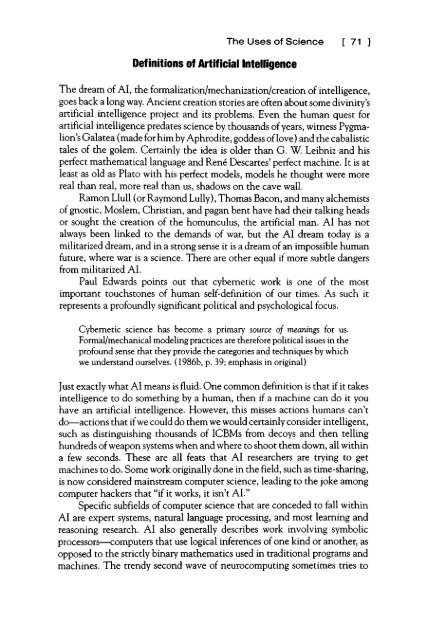entire book - Chris Hables Gray
entire book - Chris Hables Gray
entire book - Chris Hables Gray
Create successful ePaper yourself
Turn your PDF publications into a flip-book with our unique Google optimized e-Paper software.
Definitions of Artificial Intelligence<br />
The Uses of Science [ 71 ]<br />
The dream of AI, the formalization/mechanization/creation of intelligence,<br />
goes back a long way. Ancient creation stories are often about some divinity's<br />
artificial intelligence project and its problems. Even the human quest for<br />
artificial intelligence predates science by thousands of years, witness Pygmalion's<br />
Galatea (made for him by Aphrodite, goddess of love) and the cabalistic<br />
tales of the golem. Certainly the idea is older than G. W. Leibniz and his<br />
perfect mathematical language and Rene Descartes' perfect machine. It is at<br />
least as old as Plato with his perfect models, models he thought were more<br />
real than real, more real than us, shadows on the cave wall.<br />
Ramon Llull (or Raymond Lully), Thomas Bacon, and many alchemists<br />
of gnostic, Moslem, <strong>Chris</strong>tian, and pagan bent have had their talking heads<br />
or sought the creation of the homunculus, the artificial man. AI has not<br />
always been linked to the demands of war, but the AI dream today is a<br />
militarized dream, and in a strong sense it is a dream of an impossible human<br />
future, where war is a science. There are other equal if more subtle dangers<br />
from militarized AI.<br />
Paul Edwards points out that cybernetic work is one of the most<br />
important touchstones of human self-definition of our times. As such it<br />
represents a profoundly significant political and psychological focus.<br />
Cybernetic science has become a primary source of meanings for us.<br />
Formal/mechanical modeling practices are therefore political issues in the<br />
profound sense that they provide the categories and techniques by which<br />
we understand ourselves. (1986b, p. 39; emphasis in original)<br />
Just exactly what AI means is fluid. One common definition is that if it takes<br />
intelligence to do something by a human, then if a machine can do it you<br />
have an artificial intelligence. However, this misses actions humans can't<br />
do—actions that if we could do them we would certainly consider intelligent,<br />
such as distinguishing thousands of ICBMs from decoys and then telling<br />
hundreds of weapon systems when and where to shoot them down, all within<br />
a few seconds. These are all feats that AI researchers are trying to get<br />
machines to do. Some work originally done in the field, such as time-sharing,<br />
is now considered mainstream computer science, leading to the joke among<br />
computer hackers that "if it works, it isn't AI."<br />
Specific subfields of computer science that are conceded to fall within<br />
AI are expert systems, natural language processing, and most learning and<br />
reasoning research. AI also generally describes work involving symbolic<br />
processors—computers that use logical inferences of one kind or another, as<br />
opposed to the strictly binary mathematics used in traditional programs and<br />
machines. The trendy second wave of neurocomputing sometimes tries to








